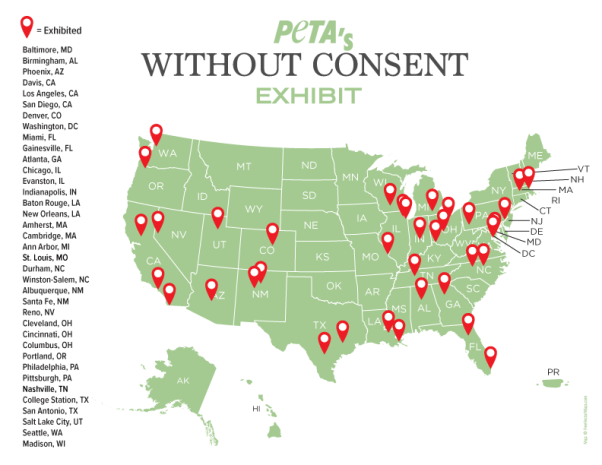PETA’s Historical Exhibit ‘Without Consent’ Comes to an End
Documenting a Long History of Violent Experiments
PETA’s landmark historical exhibit established a timeline of U.S. medical experimentation on vulnerable and oppressed humans—including immigrant women subjected to experimental gynecological surgeries, unsuspecting soldiers dosed with LSD or forced into racist poison gas tests, and Black men used in deadly syphilis experiments—as well as on nonconsenting animals. The exhibit’s 24 panels displayed descriptions and photographs of nearly 200 tests conducted at U.S. institutions in recent decades.
Dogs and Other Animals Are Poisoned and Tormented
Almost 65,000 dogs are tormented in U.S. laboratories every year. Each is an individual who experiences fear, loneliness, love, and pain, yet they’re deprived of everything that’s natural and important to them. They’re poked, prodded, biopsied, infected, injected, and robbed of their babies. Many are isolated inside steel cages, with nothing to see or do.
Dogs, who are remarkably social and intelligent and can recognize almost 200 human words, are a favored species for toxicology studies. In these experiments, large doses of a test substance—such as a drug, an industrial chemical, a pesticide, or a household product—are force-fed to animals or injected into their bodies, slowly poisoning them. Despite the availability of high-tech research methods—including organs-on-chips and high-speed computers programmed with human data—dogs are used in a variety of invasive and sometimes extremely painful experiments.
Each year, experimenters imprison over 110 million sentient beings—who value their lives just as we value ours—in laboratories across the U.S. Most of the animals who survive the horrors of experiments are killed.
PETA Has Been Making Waves for Dogs and Other Animals Used in Experiments
Thanks to a PETA undercover investigation into Inotiv’s Envigo dog-breeding facility in Virginia, which is now closed down, 4,000 beagles bred for experiments have been rescued from the site.
“‘Without Consent’ told the true stories of dogs and other animals who were harmed and killed in experiments that they did not and could not consent to,” says PETA Vice President Dr. Alka Chandna. “Humans are only one animal species among many, and having the power to exploit the others doesn’t give us the right to do so.”
‘Without Consent’: Looking at the Numbers
“Without Consent” first hit the streets in 2021 and ran until late April 2024 after making its way across the country:
- The exhibit traveled to 37 cities.
- Information about the horrors of experimentation was shared with over 22,000 engaged visitors.
- Over 2,700 visitors contacted their legislators to oppose animal testing, urging them to endorse PETA’s Research Modernization Deal

In creating a platform to raise awareness of how animals suffer in experiments and to encourage collective action to end cruel tests, “Without Consent” has been stunningly effective. We can’t change history—but we can help create a better future.
Missed the Tour? You Can Still Help!
PETA is calling on NIH—which spends over $21 billion in taxpayer funds annually on animal tests alone—to phase out these archaic experiments and adopt our Research Modernization Deal.
**These actions are limited to residents of the U.S. Discover six other ways you can help animals suffering in experiments no matter where you live.


